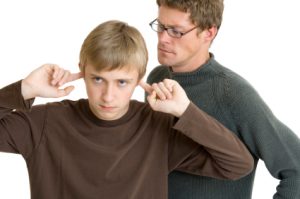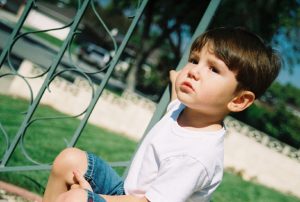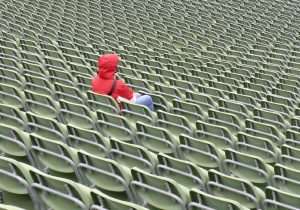How Childhood Defenses Hurt Us As Adults

As adults, we are often asked to reflect on the positive influences, role models, and experiences from our past that shaped who we are today. Just as often, in everything from college essays to job interviews, we are asked to retrace an obstacle we overcame, a challenge we faced head on, or a disadvantage we wouldn’t allow to hold us down. As human beings, we are shaped by our environment. Every high and low molds us into who we are, for better or for worse. This is most true of when we are young and our brain is rapidly developing. The power of everything from an unheard cry to an unmarked facial expression can have a heavy impact on a child’s evolving psyche.
Positive interactions in our development can lead us to develop what my father psychologist Robert Firestone and I refer to as the “self-system.” The self-system is made up of the unique qualities of the individual combined with a harmonious identification and incorporation of parent’s positive attitudes and traits. Of course, no person, or parent, is perfect. The “Division of the Mind” is a model my father and I developed, which poses that every person is divided. People both love and hate themselves, and, as parents, they extend both reactions to their productions, i.e., their children.
While the nurturance of a parent enriches their children’s self-system, rejection, neglect, or hostility from a parent leads to the formation of an “anti-self system.” The anti-self system extends from a destructive identification with and incorporation of negative parental traits. When we internalize destructive attitudes during hurtful or traumatic experiences in our past, we strengthen our anti-self. As we grow up, our anti-self resides within us and encourages us to take actions that replicate our past but that are damaging to us in the present.
There are many traits we developed as children that served a purpose in our childhood but actually hinder us in adulthood. Say we felt heavily intruded on by our parents while growing up. Perhaps, we suffered the wrath of a critical mother or the frustration of a father who worried excessively about everything from our winter weight gain to our average SAT scores. As kids, we may have armed ourselves against our parents’ shortcomings by keeping to ourselves, rebelling against restraints, or commanding a self-prescribed perfectionism. More than likely we acquired some bad habits along the way. A father who broke promises may have taught us to be less trusting of those close to us. A mother who ignored us may have left us feeling self-reliant and guarded against wanting anything from someone else.
These characteristics served as “defenses” in our youth. They shielded us from fully experiencing the pain and even terror of recognizing the faults of those responsible for our well-being. Growing up, it was our parents’ duty to protect us. Our survival depended on them. This dependence is part of what made our parent’s actions so significant to our development and what gave them such strong influence over us. To an adult, having another adult erupt in anger or act victimized by us might spark in us a feeling of anger or provocation. But for a child, having someone who is not only physically larger than us, but fully responsible for us, either explode in rage or fall apart can be terrifying.
Even parents with the best intentions, experience moments of stress in which they are misattuned to their children. These misattunements and moments of trauma cause children to form self-protective defenses to comfort themselves or “get by.” The defenses formed out of childhood events stay with us into adulthood. Often, they continue to serve the purpose of cutting us off from unpleasant emotions or harboring us from perceived risks. However, while our defenses may seem like a beneficial layer of protection, they usually do more harm than good.
For example, shutting off from scary experiences as a kid may have meant hiding under the bed, avoiding high-pressure situations like sports or academics, or playing video games. As an adult, it can mean becoming anti-social, avoiding goal-driven behaviors, or abusing substances like alcohol. Our defenses may influence us to engage in self-soothing rituals or to avoid perceived dangers. However, their cues are taken from past events that are no longer real threats to us. In fact, as we grow older, the defense itself often becomes the threat.
An example of this is a a man who refused to ask a woman out because he was afraid of being rejected. Though he was good-looking, kind, and funny, his shyness and insecurity made him difficult to approach. As a young boy, he had been raised as an only child with a single mother who devoted most of her energy and attention to him. The combination of her intrusiveness and strict, no-nonsense attitude left him feeling inadequate and like a constant disappointment. In response, he withdrew from social situations and developed a fear that he would let a woman down. His “defense” did keep him from being rejected, but it also kept him from meeting someone he really liked. In addition, due to his passivity, the women he did meet tended to be more dominating, a trait that further replicated dynamics from his childhood.
If we were hurt as kids in a certain way, throughout our lives we will tend to unconsciously seek out relationships in which we are hurt in the very same ways. This is not necessarily because the situations from our youth felt good, but because they feel familiar. Our defenses are tricky, because they drive us toward familiarity in an effort to shield us from the pain of our past. They may seem like they will protect us, but in truth, they tend to protect the people who hurt us, who we depended on as children. But why are we so determined to protect those who hurt us?
When we are young, we rely on our caretakers. Seeing them as flawed or unstable presents a direct threat to our survival. The defenses we form may seemingly protect us from the negative traits of those who raised us, but they also serve to protect these influential figures. For example, a woman withstood countless instances of both verbal and physical abuse throughout her adolescence from a mother, whose temper was wild and unpredictable. After long battles, in which her mother would scream and make threats against both herself and her daughter, her mother would lock herself inside her room, sobbing uncontrollably. As one can imagine, this left the daughter feeling alone and terrified. In desperation, the girl would attempt to set aside the abuse she’d withstood and would write long letters of apology to her mother. Afterward, she would slip the letters under the door in hopes that she could “fix” whatever was broken in her mother.
This act of self-sacrifice is highly common in young children. As kids, the same people who frighten or hurt us are the people we must go to for comfort and care. Therefore, we often surrender ourselves to protect our caretakers. Though most incidents might not be as glaring or dramatic as that illustrated by the above story, children are constantly adjusting themselves to please and protect their parents. These acts of sacrifice, large and small, create the core defenses that often hurt them as adults. In other words, we form a set of internalized parents that recreate emotions and interactions from early in our lives.
The connection we feel to our parents is natural. Parents can serve as positive role models, instilling traits in us that we value throughout our lifetime. However, we can also create what my father psychologist Dr. Robert Firestone termed a “Fantasy Bond” with our parents, an illusion of connection that aligns us with those who raise us and causes us to identify with them in ways that are negative as well as positive.
As I’ve said before, no person is perfect. Even the best parents are only attuned to their children about 30 percent of the time. This is why, as adults, it is important to recognize the ways that we’ve negatively adapted to the damaging side of those who cared for us as children. Once we identify how we shield ourselves from our past, we can separate from the internalized parents in our heads and move forward as independent individuals, consciously adopting traits we respect and rejecting those that hurt us.
The concept of “defenses” is the ultimate illustration of the fact that very often, our own worst enemy lies within us. It is ironic that the very defenses that saved us emotionally so long ago are now robbing us of our lives today. What originally served as a reasonable adaptation to a difficult situation can become our imprisoning agent. Too often, we live our lives shrouded in the armor of our childhood defenses-not realizing that it is safe to shed these false identities and deceptive layers of protection. When we do, we open up a whole new world of possibility, a whole new level of potential for success, happiness, adventure, and love. Most importantly, we give ourselves the greatest gift possible: freedom, the freedom to be who we are and live as we choose, released from the chains of past experience.
Tags: child to adult development, father, interactions, mother, role model, self-reflection, self-system, youth defenses









There are lots or articules on children being traumatized by parents. But what about the other way around? My daughter has been extremely difficult to deal with all if her life. I’ve done my best to help her, but I have been hurt over and over again by her. Now I am weary of trying to make an emotional connection with her now that she seems to be doing better. When i am around her I feel stressed out and tense. What would be a name to describe what I am going through? How can I get past it?
I asked people to look back on their life and think about all the things they remember from the childhood. A lot of people don’t realize that what happens around a child stays with them.
I didnt feel that my mother really loved me.
my mother was not there for me emotionally or supportive. My mother influenced and turned my oldest son against me. She was verbally and psychically abusive too. She told I would never amount to anything in my life and I was stupid and that I should(and my father!) Throw myself under a train or jump off a bridge! (Probably how she was feeling;its called projection). Anyway she says im a warm person. Yes with my children and people that I meet. But NOT in personal relationships. I am cold and closed off. I cannot REALLY love because I was NOT shown love. Just a lot of fake stuff, idealising and love bombing then put downs and finally discarded. Sound like a malignant narcissist anyone!!!! I craved love closeness and affection in my last relationship. Loved my hugs!! But was shy of intimacy even though I knew I wanted it. On our wedding day I pulled away when he went to kiss me! He tried twice more and managed to kiss me!! Hehe.. at our first dance he tried again to kiss me on lips, I pulled back! The sex was easier I find, not as intimate as kissing for me, or say slapping my behind, when he did this I froze. Did not know how to react! Hopeless I know and I was 28 with four children.
Wow thank you Doctor. As a child from a broken home, and raising a 2 year old now as a single parent, this knowledge and advise is so spot on and needed. Thank you